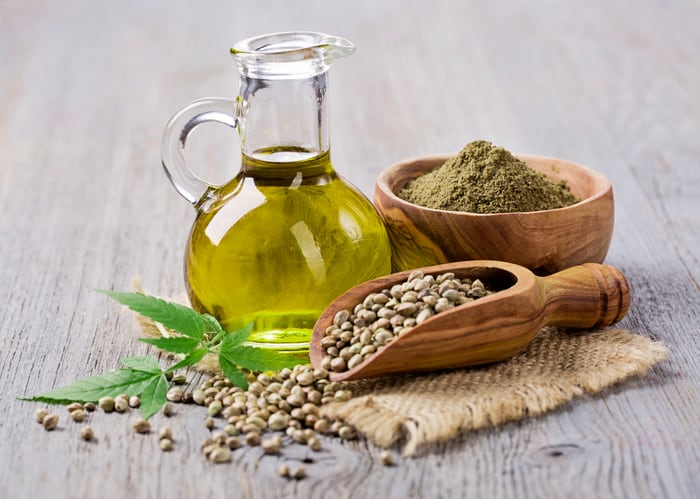The global hemp-based market for food and beverages is expected to grow by a compound annual growth rate of 24% through to 2022, according to forecasts from market research provider Technavio.
What’s driving growth?
German ingredient supplier Bell has developed a line of natural hemp flavours and extracts that it said delivers‚ 'authentic taste profiles‘ for various categories.
Announcing the launch, the company noted that innovation in the European food sector is being driven by demand for natural, clean and adventurous products.
Hemp, flavours teamleader Agneta Hoffmann told FoodNavigator, feeds into these consumer need states. "The hemp trend is going mainstream,” she noted.
“We see that hemp-based products are increasingly appearing in the food and drink sector, with a constantly rising number of new product launches especially in Europe... Since 2017, new product launches featuring hemp are increasingly driven by categories such as snacks, especially energy bars, beverages, breakfast cereals and bakery products as well as sauces and seasonings.”
Hoffmann suggested that the explosion in innovation around hemp also comes in response to growing demand for plant-based foods that deliver on positive nutrition.
“Although the use of hemp in food and drinks is nothing new, its recent popularity can be attributed to consumers' growing interest in following plant-based and free-from diets.
Moreover, hemp in general has gained high importance due to its nutritional benefits. Hemp seeds are particularly marketed as a 'superfood' due their high omega 3 and 6 content along with highly digestible protein comprised of all essential amino acids.”
The nutritional appeal of hemp has increasingly gained consumer attention. Hemp seeds contain over 9g of protein in every 30g of seeds and provide all nine essential amino acids. They also include fatty acids, such as alpha-linolenic acid (ALA), which is an omega-3, are a goof source of fibre and are rich in vitamins and minerals, including vitamin E, magnesium, phosphorus and potassium.
Hemp’s on-pack appeal
Products containing hemp often display a hemp leaf on-pack, responding to ‘consumer curiosity’ and ‘desire to experiment’ with the ingredient.
Bell’s new flavouring options are ideal open up innovation opportunities for additional product categories.
“They can be used within a variety of sweet and savoury applications, including beverages such as beer and beer-mixers, cider and spirits, or non-alcoholic beverages, baked goods, sugar confectionary, sauces such as ketchup and mayonnaise, flavoured oils and even meat marinades,” Hoffmann explained.
“Based on current market dynamics, we believe that most impact for innovative product developments will come from categories such as beer mixers or cider, flavoured water and wellness drinks, baked goods and also sauces.”
The inclusion of the flavouring in a product formulation opens the door to on-pack communication targeting consumer groups who are increasingly looking for hemp signposting.
“The hemp extract and the natural hemp flavouring with other natural flavourings both allow the depiction of hemp plant parts and declaring “hemp” or “cannabis” as part of the name of the food on-pack.”
And, Hoffmann continued, in line with the wellness theme the natural hemp extracts and flavourings are a clean label solution for manufacturers. “Using extracts in general is associated with an even more natural and cleaner product appeal to consumers and further helps to maintain a standardised product quality. It therefore represents a functional solution in product development. All products are liquid and we do provide both water- and oil-soluble versions that fit the specific category needs.”
Hemp versus CBD
Under European regulations some products that are derived from Cannabis sativa L. plant are not considered Novel Foods when using certain parts of the plant. This includes seeds, seed oil, hemp seed flour, defatted hemp seed and other products derived from the plant. As a result, products containing ingredients do not require pre-market authorisation.
In contrast cannabidiol (CBD), which has also seen a massive uptick in consumer interest, is subject to Novel Food regulations and products not on the market ahead of 1 January 2018 require pre-market authorisation. Products legally sold ahead of this date benefit from a grace-period as long as they apply for authorisation until the European Commission makes a decision on authorisation.
Despite the current regulatory uncertainty, Hoffmann is fairly upbeat on the potential of food and beverage products that contain CBD.
“Further to the hemp trend, the growing buzz around CBD is likely to fuel future innovation in food and beverage developments, based on a growing consumer desire for functional ingredients.
“CBD is classified as a novel food, and therefore not permitted in European food and drink products (as a single ingredient or in a fortified extract). There is a high potential for CBD products in USA and UK, although legal status is vague. Also, for a number of other markets, the regulatory restrictions for CBD are still creating challenges.”




